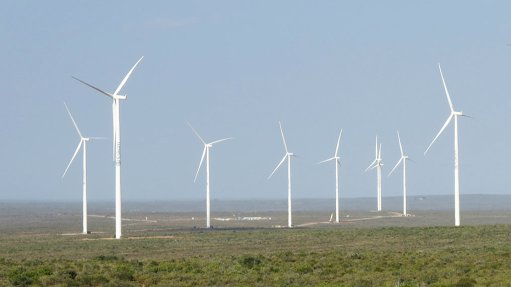Scrap it – Interrobang
This year has been one of repeat performances. So, unlike the infamous sitcom catchphrase from ʻAllo ʻAllo!, it was never a case of “Listen very carefully, I shall say this only once”. In this, the last column of the year, prepare for a repeat performance, which the Collins Dictionary describes as “usually something undesirable”; for the glass-half-full readers, it’s an encore.
On December 1, the Department of Trade, Industry and Competition (DTIC) released a background note titled ‘Policy Measures to Restrict and Regulate Trade in Waste, Scrap and Semi-Finished Ferrous and Non-Ferrous Metal Products to Arrest the Damage to Infrastructure and the Economy’. The instalment of this column published on September 16 – ‘Metal products trade control’– could be considered a preread.
The note was accompanied by several Government Gazettes: International Trade Administration Commission of South Africa Export Control Guidelines on the Exportation of Semi-Finished Metal Products; Import Control Guidelines on the Importation of Certain Metal Processing Machinery and Mechanical Appliances, Including Furnaces, Granulators, Guillotines and Shredders; Policy Implementation Actions on Measures to Restrict and Regulate Trade in Ferrous and Non-Ferrous Metals Waste, Scrap and Semi-Finished Ferrous and Non-Ferrous Metal Products; Import Control; Export Control; and Trade Policy Directive: Exportation of Ferrous and Non-Ferrous Waste and Scrap Metal.
According to the background note, on November 16, Cabinet approved a comprehensive package of measures to address the damage caused by metal theft to public infrastructure and the economy by restricting and regulating the trade in waste, scrap and semifinished metals. Implementation of the policy measures takes what may broadly be described as a three-phased approach.
This came after the DTIC received 2 800-plus comments from business, industrial associations, organised labour, State-owned enterprises, government departments, and individuals.
In Phase 1 and Phase 2 (Copper and Copper Alloys), exports of copper waste and scrap will be temporarily prohibited for six months. In Phase 1, a permit system applying to semifinished copper exports will be administered by the International Trade and Administration Commission of South Africa. In Phase 2, a licensing system will be put in place for all copper trading in South Africa. It is intended that sellers of copper waste and scrap metal will need to register under the Second-Hand Goods Act (SHGA). To register to trade in copper waste and scrap metal, applicants will need to show, among other things, tax clearance, and dealers will be required to submit detailed purchase and sales information to a centralised database. Dealers in certain semifinished metal products will also need to be registered under the SHGA, and tax clearance and reporting obligations will apply. Ferrous scrap metal will be subject to the six-month export prohibition but, unlike in the case of copper, exceptions will be made for stainless steel and ferrous waste and scrap that is produced in the ordinary course of business as a by- product of a manufacturing process. There would be lesser restrictions for metals other than copper waste and scrap metal.
In Phase 3, government will consider amendments to pertinent existing legislation, or pass new legislation, to create a dedicated metal trading licensing regime. Prohibiting the use of cash in transactions involving waste and scrap and semifinished metal products may also be introduced. In this instance, no buyer will be allowed to be in possession of waste and scrap or semifinished metal products unless it is backed up by an Electronic Funds Transfer or similar electronic record. It may also see the introduction of blacklisting where persons could become ineligible for government contracts if they have contravened the regulations or committed an offence.
If you were perplexed by the title, an ‘interrobang’ is an unconventional punctuation mark, incorporating both a question mark and an exclamation mark (?!).
Article Enquiry
Email Article
Save Article
Feedback
To advertise email advertising@creamermedia.co.za or click here
Announcements
What's On
Subscribe to improve your user experience...
Option 1 (equivalent of R125 a month):
Receive a weekly copy of Creamer Media's Engineering News & Mining Weekly magazine
(print copy for those in South Africa and e-magazine for those outside of South Africa)
Receive daily email newsletters
Access to full search results
Access archive of magazine back copies
Access to Projects in Progress
Access to ONE Research Report of your choice in PDF format
Option 2 (equivalent of R375 a month):
All benefits from Option 1
PLUS
Access to Creamer Media's Research Channel Africa for ALL Research Reports, in PDF format, on various industrial and mining sectors
including Electricity; Water; Energy Transition; Hydrogen; Roads, Rail and Ports; Coal; Gold; Platinum; Battery Metals; etc.
Already a subscriber?
Forgotten your password?
Receive weekly copy of Creamer Media's Engineering News & Mining Weekly magazine (print copy for those in South Africa and e-magazine for those outside of South Africa)
➕
Recieve daily email newsletters
➕
Access to full search results
➕
Access archive of magazine back copies
➕
Access to Projects in Progress
➕
Access to ONE Research Report of your choice in PDF format
RESEARCH CHANNEL AFRICA
R4500 (equivalent of R375 a month)
SUBSCRIBEAll benefits from Option 1
➕
Access to Creamer Media's Research Channel Africa for ALL Research Reports on various industrial and mining sectors, in PDF format, including on:
Electricity
➕
Water
➕
Energy Transition
➕
Hydrogen
➕
Roads, Rail and Ports
➕
Coal
➕
Gold
➕
Platinum
➕
Battery Metals
➕
etc.
Receive all benefits from Option 1 or Option 2 delivered to numerous people at your company
➕
Multiple User names and Passwords for simultaneous log-ins
➕
Intranet integration access to all in your organisation

















